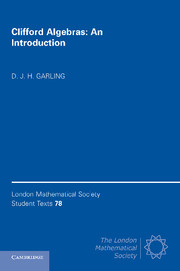3 - Multilinear algebra
Published online by Cambridge University Press: 05 June 2012
Summary
To each finite-dimensional vector space E equipped with a non-singular quadratic form, there is associated a universal Clifford algebra A. If dim E = d then dim A = 2d; each time we increase the dimension of the vector space by 1, the dimension of the algebra doubles. This suggests strongly and correctly that the algebra should be constructed as a tensor product. Many mathematicians feel uncomfortable with tensor product spaces, since they are constructed as a quotient of an infinite-dimensional space by an infinite-dimensional subspace. Here we avoid this, by making systematic use of the duality theory of finite-dimensional vector spaces. In the same way, we use duality to construct the exterior algebra of a finite-dimensional vector space (which is a particular example of a Clifford algebra) and to construct its symmetric algebra.
In this chapter, K will denote either the field R of real numbers or the field C of complex numbers.
Multilinear mappings
Suppose that E1, …, Ek and F are vector spaces over K. A mapping T : E1 × … × Ek → F is multilinear, or k-linear, if it is linear in each variable:
for α, β ∈ K, xj, yj ∈ and 1 ≤ j ≤ k. Under pointwise addition, the k-linear mappings from E1 × … × Ek into F form a vector space, which is denoted by M(E1, …, Ek; F).
- Type
- Chapter
- Information
- Clifford Algebras: An Introduction , pp. 36 - 58Publisher: Cambridge University PressPrint publication year: 2011



